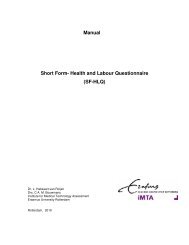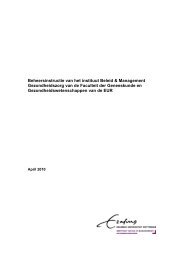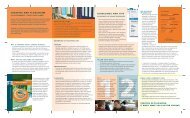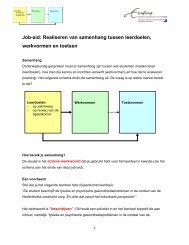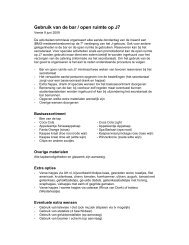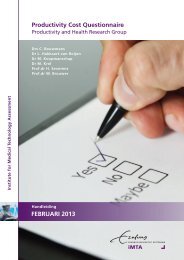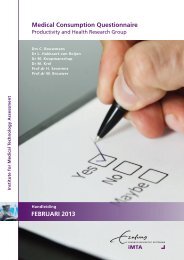118Chapter 7entirely justified, for, as was shown above, many equity theories precisely requirethat priority be given to the young and to the most life-threatening diseases.This is not the answer to all questions, however. One significant problem remainsthat each of these theories loses its force at some point. For example, it would besenseless to assign all health care interventions a priority ranking according topatients' age, and direct more and more money to those assigned the highestpriority (e.g., severely ill young children), no matter its effectiveness or costs.This shows that equity principles should be given effect while taking into accountcost-effectiveness arguments. Just as decision makers are expected to weighefficiency and equity objectives, the different possible equity approaches shouldbe wisely balanced against each other (in a so-called equity-equity tradeoff). Howexactly to consider equity in prioritizing health care programs for resourceallocation is an issue around which there is at present times not yet anymethodological consensus. One point of this discussion however, is fairly clear:we must be willing to sacrifice some overall efficiency for a more equitabledistribution of health. Incorporating equity arguments would probably betterexplain policy decisions in areas where cost-effectiveness analyses have beenpublished. 86 Apparently, decision makers and the public place greater emphasison equity than is reflected by cost-effectiveness analysis. Importantly, surveyfindings indicate that politicians are indeed prepared to accept a lower growth inper capita health in exchange for increased equity. 45,87Finally, continued efforts are called for to retain the good cost-effectiveness ofneonatal surgery and to properly assess cost-effectiveness in the future, withattention to new and advancing research themes such as the position of theparents and discounting. For the moment, it is safe to conclude that neonatalsurgery—although met with skepticism by people questioning the high costs oftreatment and the possibility of poor HRQoL in the survivors—yields good valuefor money. It also contributes to an equitable distribution of health and healthcare.ACKNOWLEDGMENTSThe authors gratefully acknowledge J. Hagoort for editing the manuscript.
Cost-Effectiveness of Neonatal Surgery: First Skepticized, Now Increasingly Accepted 119REFERENCES1. World Health Organization: The WorldHealth Report 2005. Make every motherand child count. Geneva, Switzerland:World Health Organization; 2005.2. Lawn JE, Cousens S, Zupan J: 4 millionneonatal deaths: when? where? why?Lancet 2005; 365(9462): 891-900.3. Drummond MF, O'Brien B, Stoddart GL,Torrance GW: Methods for the economicevaluation of health care programmes.New York: Oxford University Press;1997.4. Gold MR, Siegel JE, Russell LB,Weinstein MC (eds): Cost-effectivenessin health and medicine. New York:Oxford University Press; 1996.5. Williams A: Cost-effectiveness analysis:is it ethical? J Med Ethics 1992; 18(1):7-11.6. Eddy DM: Clinical decision making: fromtheory to practice. What do we do aboutcosts? JAMA 1990; 264(9): 1161-1170.7. Levinsky NG: The doctor's master. NEngl J Med 1984; 311(24): 1573-1575.8. Fried C: Rights and health care - Beyondequity and efficiency. N Engl J Med1975; 293: 241-245.9. Hiatt HH: Protecting the medicalcommons: who is responsible? N Engl JMed 1975; 293: 235-241.10. Mason J, Eccles M, Freemantle N,Drummond M: A framework forincorporating cost-effectiveness inevidence-based clinical practiceguidelines. Health Policy 1999; 47(1):37-52.11. O'Brien JA, Jacobs LM, Pierce D: Clinicalpractice guidelines and the cost of care.A growing alliance. Int J Technol AssessHealth Care 2000; 16(4): 1077-1091.12. Cincinnati Children's Hospital MedicalCenter: Evidence based clinical practiceguideline for hypertrophic pyloricstenosis. Cincinnati, Ohio: CincinnatiChildren's Hospital Medical Center;2001.13. Fetus and Newborn Committee,Canadian Paediatric Society: Neonatalcircumcision revisited. Can Med Assoc J1996; 154(6): 769-780.14. Sabin JE: The second phase of prioritysetting. Fairness as a problem of loveand the heart: a clinician's perspectiveon priority setting. Br Med J 1998;317(7164): 1002-1004.15. Warner KE, Hutton RC: Cost-benefit andcost-effectiveness analysis in healthcare. Growth and composition of theliterature. Med Care 1980; 18(11):1069-1084.16. Elixhauser A, Luce BR, Taylor WR,Reblando J: Health care CBA/CEA: anupdate on the growth and compositionof the literature. Med Care 1993; 31(7Suppl.): JS1-JS11.17. Elixhauser A, Halpern M, Schmier J, LuceBR: Health care CBA and CEA from 1991to 1996: an updated bibliography. MedCare 1998; 36(5 Suppl): MS1-MS9,MS18-MS147.18. Stolk EA, Post HA, Rutten FFH, MolenaarJC, Busschbach JJV: Cost-effectivenessof neonatal surgery: a review. J PediatrSurg 2000; 35(4): 588-592.19. Hackam DJ, Superina RA, Pearl RH:Single-stage repair of Hirschsprung'sdisease: a comparison of 109 patientsover 5 years. J Pediatr Surg 1997;32(7): 1028-1032.20. Roberts TE: Economic evaluation andrandomised controlled trial ofextracorporeal membrane oxygenation:UK collaborative trial. Br Med J 1998;317(7163): 911-916.21. Metkus AP, Esserman L, Sola A, HarrisonMR, Adzick NS: Cost per anomaly: whatdoes a diaphragmatic hernia cost? JPediatr Surg 1995; 30(2): 226-230.22. Caniano DA, Starr J, Ginn-Pease ME:Extensive short-bowel syndrome inneonates: outcome in the 1980s.Surgery 1989; 105(2 Pt 1): 119-124.
- Page 3:
COST-EFFECTIVENESS OF NEONATAL SURG
- Page 6 and 7:
DOCTORAL COMMITTEEPromotors:Prof.dr
- Page 9 and 10:
PUBLICATIONSChapters 2 to 7 are bas
- Page 11:
6ChapterINFORMAL CARE FOR CHILDREN
- Page 14 and 15:
2Chapter 11.1 BACKGROUND AND MOTIVA
- Page 16 and 17:
4Chapter 1provides a good overview
- Page 18 and 19:
6Chapter 1disability, and death of
- Page 21:
Introduction 9particular equity pri
- Page 25 and 26:
Introduction 1320. Oostenbrink JB,
- Page 27 and 28:
Introduction 1554. Heyman MB, Harma
- Page 29 and 30:
THE COST-EFFECTIVENESS OFTREATMENT
- Page 31:
Cost-Effectiveness of Treatment for
- Page 35 and 36:
Cost-Effectiveness of Treatment for
- Page 37 and 38:
Cost-Effectiveness of Treatment for
- Page 39 and 40:
Cost-Effectiveness of Treatment for
- Page 41 and 42:
Cost-Effectiveness of Treatment for
- Page 43 and 44:
Cost-Effectiveness of Treatment for
- Page 45:
Cost-Effectiveness of Treatment for
- Page 48 and 49:
36Chapter 3ABSTRACTBackground/Purpo
- Page 50 and 51:
38Chapter 33.2 MATERIALS AND METHOD
- Page 52 and 53:
40Chapter 3child's date of birth) a
- Page 54 and 55:
42Chapter 3diaphragm was closed (Ta
- Page 56 and 57:
44Chapter 3Total costs of treatment
- Page 58 and 59:
46Chapter 3Regarding the treatment
- Page 60 and 61:
48Chapter 3REFERENCES1. Stolk EA, P
- Page 62 and 63:
50Chapter 332. Jaillard S, Pierrat
- Page 64 and 65:
52Chapter 4ABSTRACTAims:To examine
- Page 66 and 67:
54Chapter 4Outcome measuresThe pati
- Page 68 and 69:
56Chapter 4Clearly, the symptoms st
- Page 70 and 71:
58Chapter 4The respondents did not
- Page 72 and 73:
60Chapter 4Table 4.4TAIQOL Scores o
- Page 74 and 75:
62Chapter 44.4 DISCUSSIONIn this pa
- Page 76 and 77:
64Chapter 4ACKNOWLEDGMENTSWe are in
- Page 78 and 79:
66Chapter 418. Coons SJ, Rao S, Kei
- Page 80 and 81: 68Chapter 5ABSTRACTObjective:Extrac
- Page 82 and 83: 70Chapter 5treatment. 26,27 Finally
- Page 84 and 85: 72Chapter 5CostsOnly direct costs w
- Page 86 and 87: 74Chapter 5summarized in Table 5.2.
- Page 88 and 89: 76Chapter 5Table 5.3 Direct Medical
- Page 90 and 91: 78Chapter 5Figure 5.3 illustrates o
- Page 92 and 93: 80Chapter 5severely ill newborns—
- Page 94 and 95: 82Chapter 5REFERENCES1. Bartlett RH
- Page 96 and 97: 84Chapter 533. Meinert CL: Extracor
- Page 98 and 99: 86Chapter 568. Hui TT, Danielson PD
- Page 100 and 101: 88Chapter 6ABSTRACTObjective:To inv
- Page 102 and 103: 90Chapter 6a rule. The health-relat
- Page 104 and 105: 92Chapter 6Regression analysis of h
- Page 106 and 107: 94Chapter 6that caregiving for thei
- Page 108 and 109: 96Chapter 6Table 6.5 CareQol Compar
- Page 110 and 111: 98Chapter 6children with a disabili
- Page 112 and 113: 100Chapter 6This study was of impor
- Page 114 and 115: 102Chapter 618. Poley MJ, Stolk EA,
- Page 116 and 117: 104Chapter 654. Boman KK, Viksten J
- Page 118 and 119: 106Chapter 7ABSTRACTMortality rates
- Page 120 and 121: 108Chapter 77.2 THE RELEVANCE OF CO
- Page 122 and 123: 110Chapter 7In the early 2000s, our
- Page 124 and 125: 112Chapter 7Table 7.1 Economic Eval
- Page 126 and 127: 114Chapter 7More from a policy pers
- Page 128 and 129: 116Chapter 7also expect that life-s
- Page 132 and 133: 120Chapter 723. Sydorak RM, Nijagal
- Page 134 and 135: 122Chapter 765. Glaser AW, Davies K
- Page 137 and 138: GENERAL DISCUSSION:A GUIDED TOURPRO
- Page 139 and 140: General Discussion: A Guided Tour P
- Page 141 and 142: General Discussion: A Guided Tour P
- Page 143 and 144: General Discussion: A Guided Tour P
- Page 145 and 146: General Discussion: A Guided Tour P
- Page 147 and 148: General Discussion: A Guided Tour P
- Page 149 and 150: General Discussion: A Guided Tour P
- Page 151: General Discussion: A Guided Tour P
- Page 154 and 155: 142GlossaryCharge (or: tariff)A pri
- Page 156 and 157: 144Glossaryefficient one. We are th
- Page 159 and 160: SUMMARY
- Page 161 and 162: Summary 149mortality. Finally, it i
- Page 163 and 164: Summary 151neonatal surgery. It is
- Page 165 and 166: SAMENVATTING
- Page 167 and 168: Samenvatting 155zoals directe niet-
- Page 169 and 170: Samenvatting 157Hoofdstuk 6 gaat ve
- Page 171: Samenvatting 159vereisen, waarvoor
- Page 174 and 175: 162AcknowledgmentsAlthough I am ind
- Page 176: About the AuthorBorn in De Meern (N



